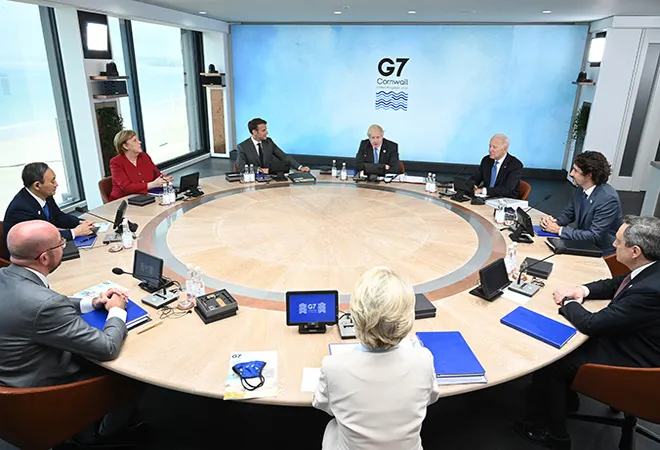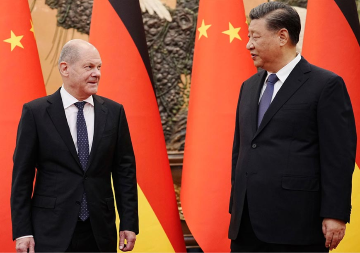
Full credit to US President Joe Biden for turning the G7 juggernaut around and bringing it back to first principles of international engagements, putting power behind forgotten moral stances of the past, and pressing the reset on values that have been deteriorating since 2008. While the six big agenda items in its 13 June 2021 Carbis Bay Summit are in themselves as piously bland as any earlier ones or the several declarations crafted by G20, it is the last (“embrace our values”) that invites special attention. The other five—end the pandemic and prepare for the future, reinvigorate economies, secure future prosperity, protect the planet, and strengthen partnerships—are the usual holy grail statements, to be made and forgotten.
That said, there is a sharp pitch that Biden has pushed for, in continuum of his predecessor Donald J Trump, in bringing values as a counter to the new rogue that has infected the world—an aggressive China. There are four direct references and one indirect action plan to help nations stand up to this aggression.
First, on the pandemic and the manner in which Beijing has prevented any investigation into its labs as being the cause of COVID-19. The G7 squarely seeks investigations into China’s role in the outbreak. Here, the World Health Organisation as well as science journals have displayed weak knees and corrupt susceptibility. The G7 hopes to correct it. Clause 16:
- Strengthening transparency and accountability, including reiterating our commitment to the full implementation of, and improved compliance with, the International Health Regulations 2005. This includes investigating, reporting and responding to outbreaks of unknown origin. We also call for a timely, transparent, expert-led, and science-based WHO-convened Phase 2 COVID-19 Origins study including, as recommended by the experts’ report, in China.
Second, as the G7 pushes for a rules-based international order, it challenges China’s “non-market policies and practices”. In other words, it is calling out China’s stealth capitalism that has allowed it to grow through access to Western markets but keeping its own selectively shut and ensuring Chinese State capital rides the entrepreneurial capital of the West. But calling out is one thing; pushing another. The communique seeks a consultative and collective approach, something that the diverse group of countries, several of which are bound together with China in a stronger financial embrace, may not work out. This is possibly the weakest link in the communique. Clause 49:
- We recognise the particular responsibility of the largest countries and economies in upholding the rules-based international system and international law. We commit to play our role in this, working with all partners and as members of the G20, UN and wider international community, and encourage others to do the same. We will do this based on our shared agenda and democratic values. With regard to China, and competition in the global economy, we will continue to consult on collective approaches to challenging non-market policies and practices which undermine the fair and transparent operation of the global economy.
Third, it calls out China’s human rights violations and smothering of freedoms. Here it crosses a pink line by mentioning the rights and freedoms of Uyghur Muslims in China’s Xinjiang region, who other than being de-religionised also act as fodder for cheap labour. It also crosses a red line by talking about autonomy in Hong Kong.
- In the context of our respective responsibilities in the multilateral system, we will cooperate where it is in our mutual interest on shared global challenges, in particular addressing climate change and biodiversity loss in the context of COP26 and other multilateral discussions. At the same time and in so doing, we will promote our values, including by calling on China to respect human rights and fundamental freedoms, especially in relation to Xinjiang and those rights, freedoms and high degree of autonomy for Hong Kong enshrined in the Sino-British Joint Declaration and the Basic Law.
And fourth, it crosses another red line by coming out in support of Taiwan and countries around the South China Sea, which China has been harassing with impunity for several years and creating security threats.
- We reiterate the importance of maintaining a free and open Indo Pacific, which is inclusive and based on the rule of law. We underscore the importance of peace and stability across the Taiwan Strait, and encourage the peaceful resolution of cross-Strait issues. We remain seriously concerned about the situation in the East and South China Seas and strongly oppose any unilateral attempts to change the status quo and increase tensions.
There is one more tame-China expression in the communique that doesn’t name the country but addresses the problems posed by it—the Build Back Better World (B3W), conceptualised by the US to narrow the US $40 trillion infrastructure needs of the developing world that has now been adopted by the G7. Under this, and led by the US, the G7 will catalyse new infrastructure partnerships across the world, to counter China’s relentless but now receding Belt and Road Initiative (BRI). This, the G7 has pledged, will strengthen education and skilling, facilitate labour market participation, and capture diversity in region, gender, age, disability, ethnicity, sexual orientation or economic status.
The B3W is not merely a financial spin to BRI or responding to the debt trap diplomacy of China’s political ambitions. It is a geopolitical ricochet around the BRI that should help create a new development model
The B3W is not merely a financial spin to BRI or responding to the debt trap diplomacy of China’s political ambitions. It is a geopolitical ricochet around the BRI that should help create a new development model. How it will play out, however, is unclear—it will need financial institutions and technologies, it will involve governments and corporations, it will affect people and communities. A much-needed idea but complex in its expression, particularly because all the G7 members, including those invited to Cornwall (India, Australia, South Korea and South Africa), are noisy democracies, the B3W should replace the BRI as a development playbook.
The G7 will now be tested around its weak links. Essentially, how its members (Canada, France, Germany, Italy, Japan, the UK, and the US, plus the EU) resolve the internal conflicts that plague their individual economic relationships with China into a collective, cohesive action. Here, the actions of Germany will be watched most closely, as it is not merely the economic anchor of Europe but also the EU, and it is seen to be compromised, trading values for cash; it will have to change. And it is changing: A new law, enacted on 9 June 2021 introduces a shift to mandatory compliance with international norms on labour exploitation.
The G7 will now be tested around its weak links. Essentially, how its members (Canada, France, Germany, Italy, Japan, the UK, and the US, plus the EU) resolve the internal conflicts that plague their individual economic relationships with China into a collective, cohesive action. Here, the actions of Germany will be watched most closely, as it is not merely the economic anchor of Europe but also the EU, and it is seen to be compromised, trading values for cash; it will have to change
On the other side, the stance of the US is clear—it is going for the jugular and attempting to force reforms in China through economic isolation. By putting its money where its geopolitical intentions are, the Biden administration is creating a counter-force to Xi Jinping’s BRI and potential returns to private companies as they build infrastructure. Between Germany and the US stand the other five G7 nations. For now, the floor belongs to the US.
The idea of B3W is finding resonance. Already, India is studying the proposal and is likely to engage with it going forward. Given that New Delhi has been on the forefront of objecting to Beijing’s BRI, notably because it passes through its territory in Pakistan Occupied Kashmir but equally because of the opaque nature of the deals with countries it runs through, joining the B3W is akin to its membership of the Quad. This is a step in the right direction, on the right side of an alternative and emerging geopolitics.
The views expressed above belong to the author(s). ORF research and analyses now available on Telegram! Click here to access our curated content — blogs, longforms and interviews.




 PREV
PREV


